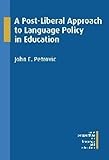APost-Liberal Approach to Language Policy in Education / John E. Petrovic.
Material type: TextSeries: New Perspectives on Language and EducationPublisher: Bristol ; Blue Ridge Summit : Multilingual Matters, [2014]Copyright date: ©2014Description: 1 online resource (136 p.)Content type:
TextSeries: New Perspectives on Language and EducationPublisher: Bristol ; Blue Ridge Summit : Multilingual Matters, [2014]Copyright date: ©2014Description: 1 online resource (136 p.)Content type: - 9781783092840
- 9781783092857
- Intercultural communication
- Language and culture
- Language and education -- Political aspects
- Language and languages -- Political aspects
- Language policy -- Political aspects
- Language policy
- LANGUAGE ARTS & DISCIPLINES / Linguistics / General
- language education
- language policy in education
- language policy
- language rights
- language variety
- liberal political theory
- liberalism
- 306.44/9
- P119.3 .P475 2015
- P40.8
- online - DeGruyter
- Issued also in print.
| Item type | Current library | Call number | URL | Status | Notes | Barcode | |
|---|---|---|---|---|---|---|---|
 eBook
eBook
|
Biblioteca "Angelicum" Pont. Univ. S.Tommaso d'Aquino Nuvola online | online - DeGruyter (Browse shelf(Opens below)) | Online access | Not for loan (Accesso limitato) | Accesso per gli utenti autorizzati / Access for authorized users | (dgr)9781783092857 |
Frontmatter -- Contents -- 1. Language Policy, Identity, and Liberalism: Some Foundational Connections -- 2. Formalist Liberalism and Language Policy -- 3. Saving Liberalism: Communities, Language, and Schooling -- 4. The Promise and Problem in Linguistic Human Rights -- 5. Post Linguistic Human Rights? -- 6. Post-Liberal Language-in- Education Policy -- 7. A Post-Liberal Approach: Broadening Language and Narrowing Policy -- References -- Index
restricted access online access with authorization star
http://purl.org/coar/access_right/c_16ec
This provocative defense of language diversity works through the strengths and weaknesses of liberal political theory to inform language policy. The book presents the argument that policy must occupy the space between 'linguistics of community' and 'linguistics of contact' in a way that balances individual autonomy and group recognition while not reifying 'language'. Drawing on the importance of the language/identity link, the author distinguishes between language negative liberalism and language positive liberalism, arguing against the former. This distinction orients consideration of increasingly specific language policy issues, such as official languages, language rights, bilingual education, and uses of language varieties within classrooms.
Issued also in print.
Mode of access: Internet via World Wide Web.
In English.
Description based on online resource; title from PDF title page (publisher's Web site, viewed 24. Apr 2022)


